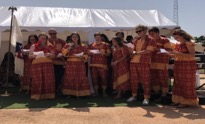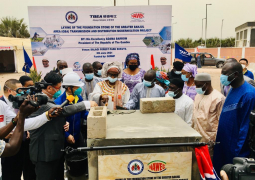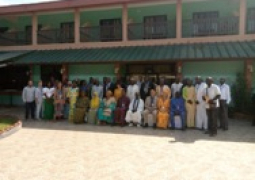
According to him, since the country was found, voluntarism has been the livelihood of America, helping to “improve people’s lives, unite our communities and strengthen our democracy.”
He pointed out that in the history of volunteerism, more than half a century ago, John F. Kennedy challenged American college students to leave the comfort of their homes and communities to devote two years of their lives to help people in the developing world.
Placing more emphasis, he said soon after he was elected in March 1961, President Kennedy established the Peace Corps on the simple principle that one person can make a difference in the world, and that a people-to-people approach is best to promote world peace, understanding and friendship.
Moreover, he added that since 1961 when the first Peace Corp volunteers arrived in Africa, they have been a leader in international development and citizen diplomacy in some 140 countries around the world, noting that globally, over 220,000 Americans have served in the Peace Corps.
“Peace Corps volunteers serve in The Gambia in all six geographic regions of the country. After an intensive training period, volunteers serve for 24 months, working directly with communities to build capacity and promote sustainable development,” Mr. Mehler added.
To the volunteers Mr. Mehler said: “Working diligently in your communities, at your sites, you will touch lives in unimaginable ways. Through your actions and attitudes, your service and your kindness to others, you will show that Americans care deeply about Gambians and are invested in working side-by-side with them for a long term.”
Kelleah B. Young, Peace Corps director in The Gambia, said after the return of Peace Corps staff, volunteers and partners back to the U.S. in March 2020 due to covid-19, Peace Corps have returned to the Gambia in a big way this year.
She said over 950 volunteers are back in 41 countries and are still aiming to return to their pre-evacuation number of 7000 volunteers worldwide, even adding a few new countries to the mix.
According to her, Peace Corps founding mission of promoting world peace and friendship among all countries remains as relevant as ever, even after 55 years of service in The Gambia and a global pandemic.
Musa M. Humma, deputy permanent secretary at the Ministry of Agriculture, said the priorities of the sector has during the decade been redirected to focus on achieving sustainable levels of food and nutrition security at household and national levels.
According to him, Peace Corps Agriculture Sector programme aims to complement the government efforts in addressing food and nutrition security of small holder farmers and natural resource management issues in the country.
Thus the project seeks to assist rural communities; to improve garden production, sustainably increase food production through the adoption of improved agricultural practices and crop diversification.
He indicated that the programme also seeks to work with communities to prevent deforestation and desertification through the establishment of tree nurseries, tree planting and beekeeping. “Volunteers are also committed to environmental education and awareness-raising in the rural communities,” he added.
Read Other Articles In Headlines
Stakeholders express concerns for removal of Chapter V from 2020 draft constitution
Dec 12, 2024, 10:14 AM




